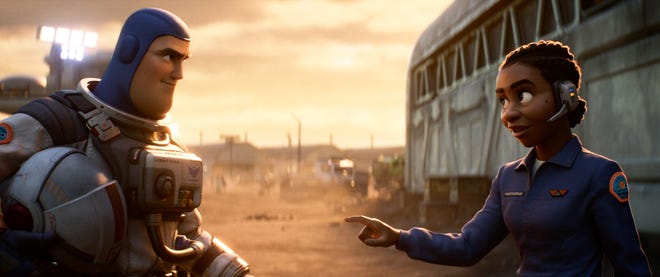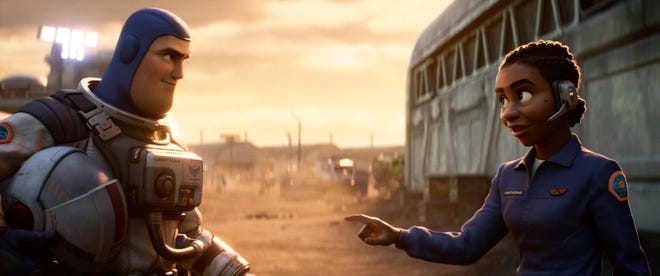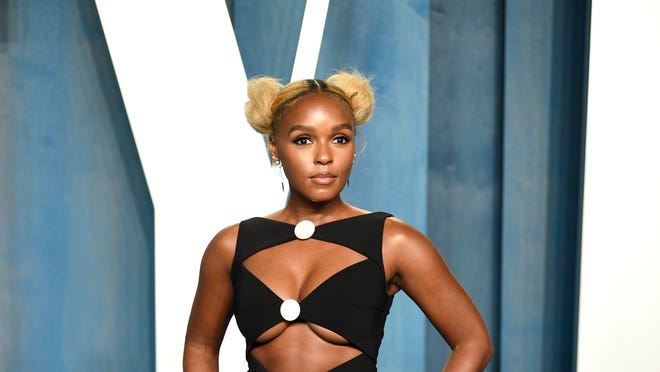In the new Pixar animated film “Lightyear,” space ranger Buzz Lightyear works through a lot of character issues, though having his best friend’s back isn’t one of them: He not only knows and respects his lesbian commander Alisha’s sexuality but is excited to hear that she’s found love while stuck on an alien planet.
Many people in the real world haven’t been so supportive.
A same-sex kiss in “Lightyear” (in theaters Friday) between Alisha (voiced by Uzo Aduba) and her partner has made international headlines, as the United Arab Emirates this week banned the Disney movie from showing in theaters because of its inclusion. The scene made waves earlier in the U.S.: It was initially cut from the film, then restored after internal uproar when it was revealed Disney had donated $200,000 to Republican politicians who supported Florida’s “Don’t Say Gay” bill, which forbids discussions of sexual orientation in elementary school classrooms.
“What this film does is handle love and those stories the way that they should be, that they are not the totality of a person,” Aduba tells USA TODAY. “It’s addressed with the same simplicity as we address any type of love, and I think that’s the way it should be.”
Review:Chris Evans’ Buzz is more fantastic than plastic in Pixar’s spiffy ‘Lightyear’

The kiss comes as part of a montage after Buzz (Chris Evans) and Alisha are marooned on a world millions of light-years from Earth. Buzz undertakes hyperspeed test flights to figure out how to get their ship home, and each four-minute trip equals four years on their space colony.
So as Buzz navigates several failed launches, Alisha meets and gets engaged to a member of the science team and they have a life together, having kids and sharing a smooch on their 40th anniversary. “I wouldn’t have met her if we hadn’t been stranded,” Alisha tells Buzz.
“Lightyear” director Angus MacLane reveals that corporate executives requested the kiss be cut from the montage during the animation process. “Basically the montage was the same,” says producer Galyn Susman. “The (queer) representation and Alisha in a relationship and all of that was there. We took out the kiss because we were asked to and we replaced it with, as Angus puts it, ‘the awkward handhold.’ “
‘I love love, who doesn’t?’:Chris Evans on ‘Lightyear,’ playing bad guys and being ‘a romantic person’
In March, the kiss was restored after Pixar animators spoke out against Disney in an open letter obtained by Variety, saying executives had demanded cuts “from nearly every moment of overtly gay affection.” Filmmakers were glad to have “an opportunity to put it back,” Susman says. “That just felt more authentic.”
In recent years, Disney has taken considerable flak for its lack of LGBTQ representation in Pixar films, including a lesbian cop in “Onward” who briefly mentions her wife and a lesbian couple strolling outside together in “Finding Dory.” Live-action films have relegated queer characters to the background – for example, the blink-and-you’ll-miss-it kiss between two women in “Star Wars: The Rise of Skywalker.”
‘Lightyear’:Pixar’s latest features queer character, emotional same-sex kiss in first footage
Aduba reports she “was not made aware” when the “Lightyear” kiss was cut but found out later. “It’s a small moment and is treated as just an indicator of the relationship,” she says.
Playing a character like Alisha in a high-profile movie in the wake of “Don’t Say Gay” and other similar legislation “means everything,” Aduba adds. “I’m happy to see Disney/Pixar sort of push through and blaze new trails in this space and I think it really creates the opportunity for children of all ages to dream and see themselves on screen.”
Evans echoes the importance of queer inclusion in Disney films but also acknowledges that “it’s kind of a mixed bag of emotions. You’re obviously thrilled that there is that representation in this movie, but you can’t help but be a little frustrated that it’s a talking point because that means it hasn’t been until now. That means it’s long overdue.
“There’s this ribbon of frustration that it’s taken this long and you almost hope that you get to a point where it doesn’t have to be something that’s mentioned because it has become the norm.”
Contributing: Patrick Ryan, USA TODAY, and The Associated Press








